Studium Generale Rietveld Academie
Studium Generale Rietveld Academie is een uitgebreid transdisciplinair theorie-programma dat zich richt op studenten en docenten van alle afdelingen van de Gerrit Rietveld Academie maar ook toegankelijk is voor publiek van buitenaf.
Jaarlijks worden een aantal curatoren uitgenodigd om rond een bepaald thema gastsprekers uit te nodigen.
Studium Generale Rietveld Academie heeft als doel inzichtelijk te maken hoe kunst en design altijd verknoopt zijn met andere domeinen (van persoonlijke tot politieke, van populaire tot academische) – hoe ons ‘nu’ met 'verleden' en 'toekomst' en ons ‘hier’ met een ‘elders’ zijn verbonden. Vanuit de overtuiging dat je alleen maar kunt leren om onafhankelijk en kritisch te denken wanneer je kennis, verbeelding en reflectie op een onorthodoxe manier met elkaar durft te verbinden, begeeft Studium Generale Rietveld Academie zich ieder jaar opnieuw in een ander opwindend onderzoekstraject dat op diverse manieren verbonden wordt met het actuele ‘discours’.
Studium Generale 2017: What is happening to our brain? – Art & life in times of cognitive automation
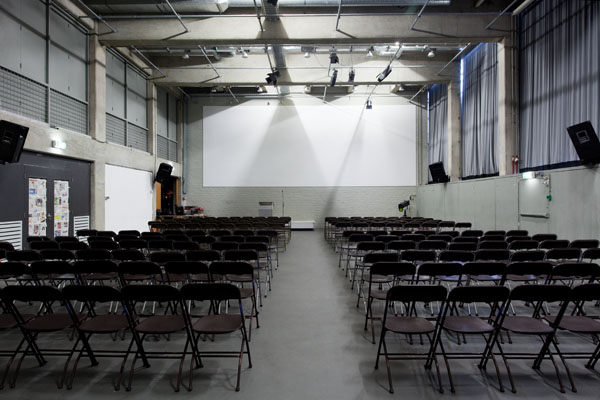
Studium Generale Archief 2000 t/m 2013 studiumgenerale.rietveldacademie.nl

Studium Generale with Amelia Groom, Constant Dullaart and Phillip Warnell & Beamclub screening
Lees meer
Wednesday March 9, 13.30 hrs at the GYM
THE SECRET LIVES OF ROCKS
AMELIA GROOM
A lecture about pebbles, boulders, gravel, tectonics, gallstones, fossils and lava – examining various lithic relations and the ways in which our petrified companions can challenge the foundations and limits of the category ‘human’.
PERFORMING WITH BOTS, OR CONTEMPORARY MATERIALITY IN A NETWORKED LANDSCAPE
CONSTANT DULLAART
In a time where everybody is their own brand, and social capital becomes the commodity of an attention economy, how can we make artworks truly reflect on our changing cultures? Dullaart will discuss his practice and recent works in which he uses the notion of the start-up, bought social media followers, distributed images, and encryption to highlight our contemporary materiality.
TIGRATOR
PHILLIP WARNELL
Screening clips from their film work and detailing his collaborations with philosopher Jean-Luc Nancy, artist-filmmaker and academic Phillip Warnell will elaborate some discursive ideas on the strange familiarity and familiar strangeness of our body oddity and its multitude of permutations, along with considering the translation of inter-species life-worlds. Warnell will introduce and screen his most recent film, Ming of Harlem.
Amelia Groom is a writer and educator living in Amsterdam. She holds a PhD in Art History and Theory from the University of Sydney, and her writing has appeared in various exhibition contexts, art journals, artist monographs, etc. She currently teaches theory and writing in the Critical Studies masters programme at the Sandberg Instituut, and in the Graphic Design department at the Gerrit Rietveld Academie.
Constant Dullaart‘s practice reflects on the broad cultural and social effects of communication and image processing technologies, from performatively distributing artificial social capital on social media to completing a staff-pick Kickstarter campaign for a hardware start-up called DulltechTM. His work includes websites, performances, routers, installations, startups, armies, and manipulated found images, frequently juxtaposing or consolidating technically dichotomized presentation realms. Recent solo exhibitions include The Possibility of an Army, Kunsthalle Schirn, Frankfurt; Jennifer in Paradise, Futura, Prague; The Censored Internet, Aksioma, Ljubljana (2015) Group exhibitions include Electronic Super Highway, Whitechapel gallery, London; Then They Form Us, MCA, Santa Barbara; When I Give, I Give Myself, Van Gogh Museum, Amsterdam; Algorithmic Rubbish, Stedelijk Museum Bureau Amsterdam (2015). Dullaart has curated several exhibitions and lectured at universities and academies throughout Europe, most currently at the Werkplaats Typografie. Recently he has been awarded the Prix Net-Art 2015.
Phillip Warnell is an artist-filmmaker and academic. He produces cinematic works exploring a range of philosophical and poetic thematics; ideas on human-animal relations, the emergence of criminality in youth and politics of the dispossessed, the presence of those with extraordinary attributes, and the poetics of bodily and life-world circumstances. His films are performative, establishing elements for a film shoot as (part) event, resulting in an interplay between scripted and precarious filming circumstances. His most recent film, Ming of Harlem, won the Prix Georges de Beauregard at FID Marseille film festival in 2014 and the Universities Culturgest Prize at Indie Lisboa in 2015. Warnell’s film work has been screened internationally in festivals and galleries. His writings on cinema, performance and animality have been distributed in a range of publications. He currently works as an executive producer for the Random Acts London network consortium with Kingston University and the ICA, commissioning short films for Channel 4. He is an Associate Professor and Director of Studies on MA Experimental Film and BA Filmmaking at Kingston University, London.
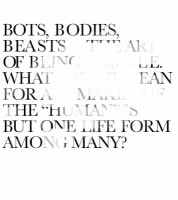
STUDIUM GENERALE with Ine Gevers, Rick Dolphijn and Metahaven & Beamclub screening
Lees meer
ALGORHITMIC RESISTANCE HACKING HABITAT ON ‘A-WHERENESS’ AS A PRECONDITION FOR LIFE-HACKING // INE GEVERS
HACKING HABITAT studies and maps the affects provoked by hightech controlled habitats - a world where people are increasingly separated from their means of (re)production- and practices of resistance and their effects. Objective of the project is to deliver both critical and affirmative answers, propositions and action perspectives to specific questions. Our goal is to to allow for new alliances between humans and machines and leading to emancipation, resilience, and a more equal appreciation of lives and information across differences. The talk will focuss on how to develop a new sense of ‘a –whereness’, which, much like becoming ecologically intelligent, depends on our responsiveness and willingness to deconstruct the liberal human and anthropocentic ‘subject’ as to allow ourselves to enter into somatechnic relationships as a precondition to life-hacking.
THINKING ART AS A PHILOSOPHY OF NATURE // RICK DOLPHIJN
Deleuze and Guattari famously claimed that art does not wait for the human being to begin. Art is then not to be considered a product of the human mind or as a creation of the human artist. Instead, it should be seen as a particular event in which the human being might play a role. The question to ask then is: in what way does art matter? Discussing contemporary experiments in performance art, installation art and bio art, the goal of this talk is twofold. First, we need to ask ourselves again what it is that art is reveiling. Second, we need to rethink the role of the human being in art.
PROPAGANDA ABOUT TRANSPARENCY—TRANSPARENCY ABOUT PROPAGANDA //
METAHAVEN
The 21st century is under the influence of the dual forces of transparency and propaganda. Both represent fictions. One is that of an untainted and self-evident truth, effected through the unlimited release of data. The other is that of a self-created bubble, where every piece of information reinforces and enhances an emotionally powerful (and politically explosive) cocktail of hopes and disillusions. Both these fictions—transparency and propaganda—are also forces of design and art.
Ine Gevers is curator, writer and activist. Among the exhibitions and publications are: Place, Position, Presentation, Public, Maastricht, 1992, Cultural Identity: Fiction or Necessity, Maastricht, 1990, Ik + de Ander. Art and the Human Condition, Amsterdam 1994, Beyond Ethics and Aesthetics, SUN, 1997, Encountering the Culture of the Norm, Amsterdam, 2000, Niet Normaal ·Difference on Display, Beurs van Berlage, Amsterdam, 2010 nietnormaal.nl (Berlin, 2011, Liverpool,2012),Yes Naturally. how art saves the world, Gemeentemuseum, The Hague, 2013, proposing non-anthropocentric worldview in order to become ecologically intelligent. ja-natuurlijk.com. Currently she prepares the large scale international exhibition HACKING HABITAT, contributing to a new sense of ‘a-whereness’ as a precondition to algorithmic resistance and the practice of life-hacking. hackinghabitat.com
Rick Dolphijn is a writer and a philosopher teaching at the Faculty of Humanities, Utrecht University. He is interested in continental philosophy, art, technology and contemporary activism. He published in journals like Collapse, Deleuze Studies and Continental Philosophy Review. His books include New Materialism: Interviews and Cartographies (with Iris van der Tuin) and This Deleuzian Century: Art, Activism, Life (edited with Rosi Braidotti). He is finishing a new monograph entitled Surfaces: How Philosophy and Art Matter.
Metahaven was founded by Daniel van der Velden and Vinca Kruk in 2007. Originally experimental graphic designers, Metahaven turned to art and moving image as a natural progression of their research into aesthetics and politics after the internet. They worked with organizations like WikiLeaks and Independent Diplomat, and produce music videos with progressive EDM superstar Holly Herndon. Metahaven’s recent publications include Uncorporate Identity, Can Jokes Bring Down Governments?, and Black Transparency. Together, Kruk and Van der Velden teach at the European Graduate School in Saas-Fee, Switzerland. Their work has been exhibited at MoMA PS1, the Victoria & Albert Museum, Artists Space NYC, and the Museum of Modern Art Warsaw, among others.

ARE YOU ALIVE OR NOT? Looking at ART through the lens of THEATRE. March 18-22
Lees meer
An overview of the programme of the 5-day conference at de Brakke Grond.
more info at areyoualiveornot.rietveldacademie.nl
Visit the facebook page
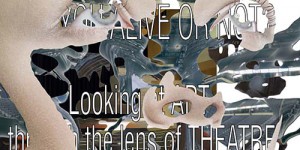
March 18 – 22 Studium Generale & Uncut present ARE YOU ALIVE OR NOT? Looking at ART through the lens of THEATRE.
Lees meer
Around 35 individual and collaborative student projects will be displayed at De Brakke Grond, intersecting with a four-day symposium convened and moderated by invited curators:
Claire Tancons (curator, New Orleans)
David Weber-Krebs (theatre maker Brussels)
Joanna Warsza (curator, Berlin)
Claire Bishop (art historian, New York)
March 18
Vernissage Are You Alive Or Not? / Uncut featuring costumes, props, installations, stage designs, scripts & performances devised by Rietveld students.
March 19
Featuring Nicolina Eklund, Rana Hamadeh & Theodor Ringborg, Claire Tancons & Florian Göttke & Jack Santino, Andrea Bozic.
March 20
Curated and presented by David Weber-Krebs
With contributions by Andrea Božić, André Eiermann, Nikolaus Gansterer, Maximilian Haas, Mette Ingvartsen, André Lepecki, Jeroen Peeters and David Weber-Krebs.
March 21
Curated and presented by Joanna Warsza
Featuring Claire Bishop, Joanna Warsza, Milo Rau's Moscow Trials, Ekaterina Degot, Chto Delat's Dmitry Vilenski, a film by Artur Zmijewski, Florian Malzacher, a curtain by Dominique Gonzalez-Foerster.
March 22
Curated and presented by Claire Bishop
With Gavin Butt, Claire Bishop, Annie Dorsen, Alexandra Pirici, Jesse Darling, 100 first year students Rietveld Academie & Mårten Spångberg.
Visit areyoualiveornot.rietveldacademie.nl for details
Like the facebook page for the latest updates
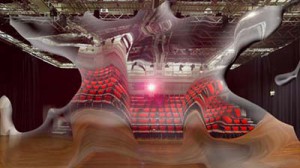
Studium Generale 2015 ARE YOU ALIVE OR NOT: March 18-22 at de Brakke Grond
Lees meer
Gerrit Rietveld Academie presents: ARE YOU ALIVE OR NOT? Looking at ART through the lens of THEATRE, Conference-festival at De Brakke Grond
Through talks, readings, live performances, screenings and masterclasses, ARE YOU ALIVE OR NOT? Looking at ART through the lens of THEATRE proposes itself as a ‘modus operandi’ for generating knowledge, ideas, questions, collaborations, happenings and things. The project takes it's intial inspiration from a wish expressed in the introduction to Claire Bishop's book Artificial Hells, Participatory Art and the Politics of Spectatorship:
"It is hoped that these chapters might give momentum to rethinking the history of twentieth-century art through the lens of theatre rather than painting or the ready-made".
For further information, detailed time-table & updates see:
areyoualiveornot.rietveldacademie.nl
Rietveld students & staff free entrance.
Day ticket € 15 with student discount € 10
Four-day ticket € 40 with student discount € 20
Reservations: reservation-studiumgenerale@rietveldacademie.nl
Visit the Facebook event
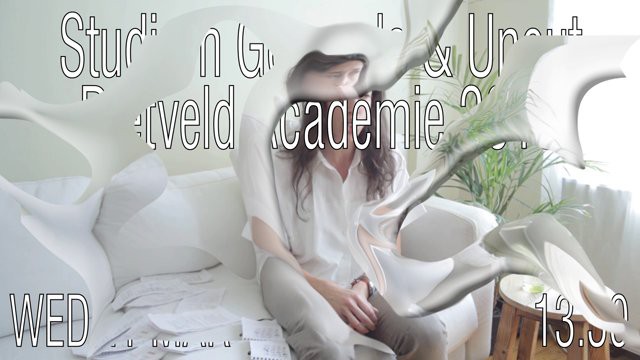
Studium Generale Rietveld Academie Happening at MAAGDENHUIS, March 11, 2015
Lees meer
ARE YOU ALIVE OR NOT?
Looking at ART through the lens of THEATRE
Wednesday, March 11
Studium Generale Rietveld Academie received an invitation to relocate it's March 11 session from the Rietveld's GYM to the occupied Maagdenhuis. We have accepted and will join the staff and students at the University of Amsterdam as an act of solidarity and as an alternative mode of "looking at art through the lens of theatre".
ACT 1, SCENE 7
With Charles Esche, Mercedes Azpilicueta, Gabriëlle Schleijpen, Tarja Szaraniec, Nikos Doulos and many others
13.30–14.15 hrs
'Are You Alive Or Not?' introduction to the program of the upcoming conference-festival & master classes Are You Alive Or Not ? March 18-22 by Gabriëlle Schleijpen / Lauren Alexander, Tarja Szaraniec, Nikos Doulos
14.15–14.45 hrs
'I committed a Happening' is a lecture performance especially created for this occasion at the Maagdenhuis, that tours some of the works of a generation of artists in Argentina during the 1960´s who understood artistic practice as a form of action towards a social change.
Mercedes Azpilicueta (AR) is a visual artist and performer currently in residence at the Rijksakademie van Beeldende Kunsten in Amsterdam.
14.45-15.30 hrs
Open discussion around art, theatre, democracy, autonomy/heteronomy, academy, university and how to reclaim the commons (air, water, land, food, care, education, culture, art) from 'capital'.
15.30-...
An attempt will be made to create a group performance as a collective gesture of re-appropriation. This is a Rietveld student & alumni initiative.
At Maagdenuis. Address: Spui 21, Amsterdam.
IMPORTANT: Rietveld students are kindly asked to bring their Rietveld student card.
Non-students are welcome, entrance free.
more information about Studium Generale
more information about Rietveld Uncut
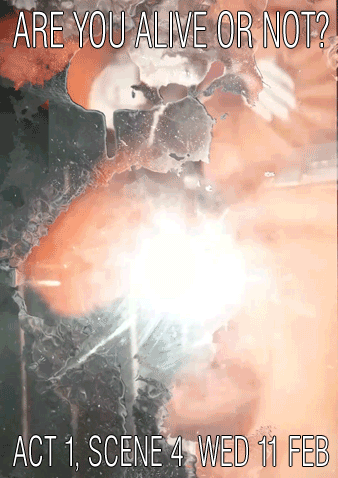
Studium Generale & Uncut Rietveld Academie 2015
Lees meer
ARE YOU ALIVE OR NOT?
Looking at ART through the lens of THEATRE
Wednesday, February 11
ACT 1, SCENE 4
Enter: Tadeusz Kantor (Maaike Gouwenberg & Joanna Zielińska)
Harry, Speaking in Tongues (Richard John Jones, Robertas Narkus, Gerard Ortín and Aki Spadaro)
13.30–15.30 hrs
A dialogue in several parts by Maaike Gouwenberg & Joanna Zielińska,
interspersed with visuals and a live performance by Richard John Jones.
With additional voices by Robertas Narkus, Gerard Ortín and Aki Spadaro, on piano.
15.45–17.30 hrs
Beamclub screening of artist films compiled by Gouwenberg & Zielińska:
Der Schlamm von Branst – Jos de Gruyter & Harald Thys,
Vision Verticale –Marvin Gaye Chetwynd,
The Saprophage – Nathaniel Mellors,
It Takes Tea To Tango– Uta Eisenreich and more!
At Rietveld's GYM
Fred Roeskestraat 96, Amsterdam
IMPORTANT: Rietveld students are kindly asked to bring their Rietveld student card.
Non-students are welcome, entrance free.
more information about Studium Generale
more information about Rietveld Uncut
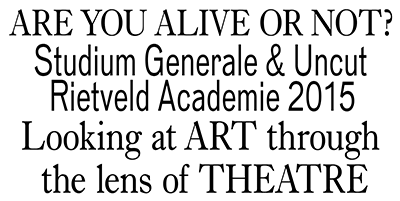
Studium Generale 2015 Rietveld Academie
Lees meer
ARE YOU ALIVE OR NOT?
Looking at ART through the lens of THEATRE
Studium Generale & Rietveld Uncut 2015
Wednesday 14th January
13.30-15.30
Talks & presentations by Virág Szentkirályi, Florian Göttke and Nat Muller.
At Rietveld's GYM
Fred Roeskestraat 96, Amsterdam
IMPORTANT: Rietveld students are kindly asked to bring their Rietveld student card.
Non-students are welcome, entrance free.
more information about Studium Generale
more information about Rietveld Uncut
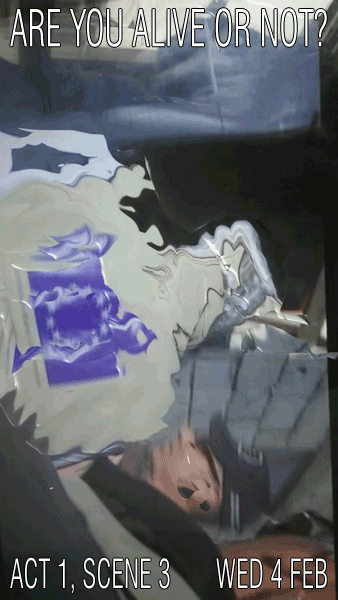
Studium Generale & Uncut 2015 Rietveld Academie
Lees meer
ARE YOU ALIVE OR NOT?
Looking at ART through the lens of THEATRE
ACT 1, SCENE 3
Enter: Alain Badiou (Vincent van Gerwen Oei), Jonas Staal (Jonas Staal), We Are Here Cooperative (Maryama, Sami, Osman, Elke) and Frascati Theater (Lara Staal)
Wednesday 4th February
13.30-15.30 hrs
Talks by Vincent van Gerwen Oei and Jonas Staal, a re-enactment by We Are Here Cooperative preceded by a note from Lara Staal.
15.45-18.00 hrs
Beamclub screening: Bamako by Abderrahmane Sissako (2006)
At Rietveld's GYM
Fred Roeskestraat 96, Amsterdam
IMPORTANT: Rietveld students are kindly asked to bring their Rietveld student card.
Non-students are welcome, entrance free.
more information about Studium Generale
more information about Rietveld Uncut
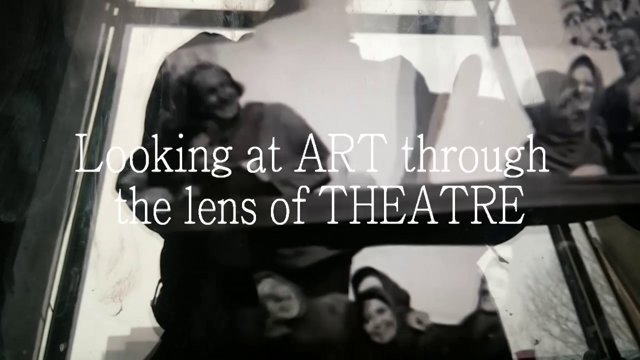
ARE YOU ALIVE OR NOT? Studium Generale lecture 21st Januari 2015
Lees meer
are you alive or not?
STUDIUM GENERALE & UNCUT '15
Looking at ART through the lens of THEATRE
ACT 1, Scene 2
Enter: Antonin Artaud (Thomas Crombez, Arnisa Zeqo)
Gina Pane (Stefanie Seibold and Teresa Diaz Nerio)
Dan Graham (screening)
Wednesday 21st January
13.30-15.30
Talks & lecture-performance by:
Thomas Crombez, Arnisa Zeqo, Stefanie Seibold and Teresa Diaz Nerio
15.45-16.45
Beamclub:
Dan Graham's video essay Rock My Religion (1982 - 1984)
At Rietveld's GYM
Fred Roeskestraat 96, Amsterdam
IMPORTANT: Rietveld students are kindly asked to bring their Rietveld student card.
Non-students are welcome, entrance free.
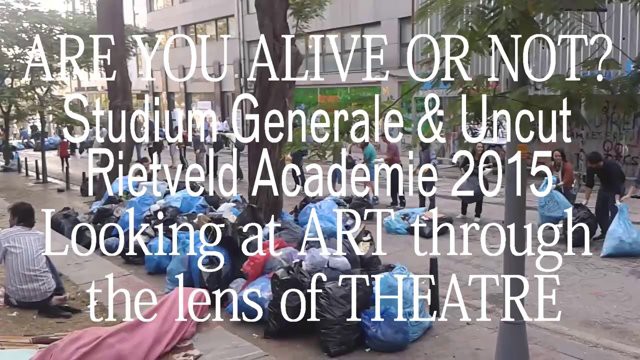
ARE YOU ALIVE OR NOT? Studium Generale lecture 14th Januari 2015
Lees meer
ARE YOU ALIVE OR NOT?
Looking at ART through the lens of THEATRE
Studium Generale & Uncut '15
Act 1, Scene 1
Enter: Mikhail Bakhtin (Florian Göttke),
Jompet Kuswidananto (Virág Szentkirályi) and Wael Shawky (Nat Muller)
Wednesday 14th January
13.30-15.30
Talks & presentations by Virág Szentkirályi, Florian Göttke and Nat Muller.
15.45-16.45
Beamclub screening "Cabaret Crusdes: The Path to Cairo" by Wael Shawky
At Rietveld's GYM
Fred Roeskestraat 96, Amsterdam
IMPORTANT: Rietveld students are kindly asked to bring their Rietveld student card.
Non-students are welcome, entrance free.
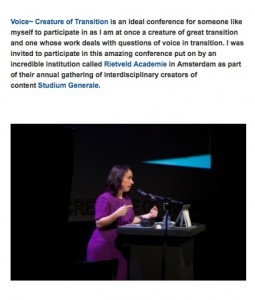
VOICE ~ CREATURE OF TRANSITION in HASTAC
Lees meer
HASTAC bezocht het Studium Generale program en schreef er een artikel over. Door: Anna Kipervaser, HASTAC
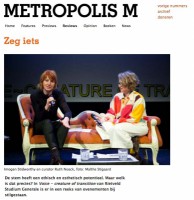
VOICE ~ CREATURE OF TRANSITION in Metropolis M
Lees meer
Metropolis M volgde een dagprogramma van het Studium Generale. Verslaggeving van Julia Steenhuisen, Metropolis M
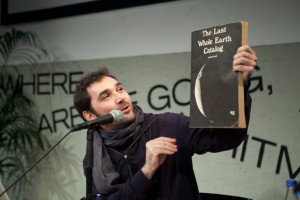
Where Are We Going Walt Whitman? In Metropolis M.
Lees meer
Metropolis M volgde de eerste dag van het Studium Generale, Verslaggeving van Hinde Haest Metropolis M
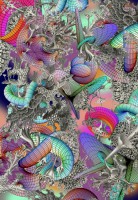
WHERE ARE WE GOING WALT WHITMAN? Studium Generale
Lees meer
JAPAN SYNDROME — AMSTERDAM VERSION
Klik hier voor het programma van 13 maart
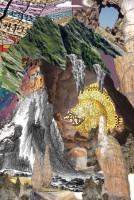
WHERE ARE WE GOING WALT WHITMAN? Studium Generale
Lees meer
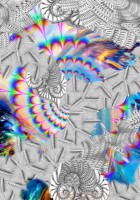
WHERE ARE WE GOING WALT WHITMAN? Studium Generale
Lees meer
LANDINGS: EXTRACTED BODIES
AND SELF-CARTOGRAPHIES
POIESIS OF WORLDING
Klik hier voor het programma van 15 maart
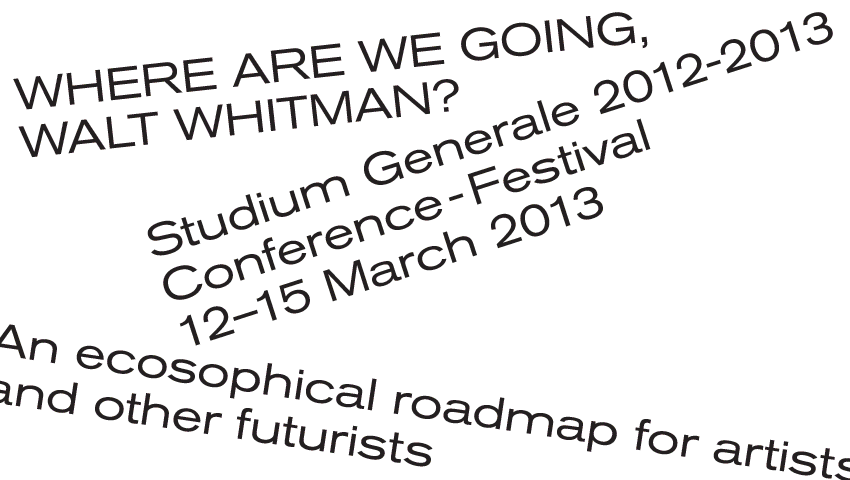
WHERE ARE WE GOING WALT WHITMAN? Studium Generale 2012-2013
Lees meer
By exploring the potentialities of ecological worldviews, old and new, through theory and art, WAWGWW seeks to accelerate, accumulate, animate and activate our poetical and political understanding of the world. To this aim Gabriëlle Schleijpen, head of Studium Generale Rietveld Academie invited Anselm Franke, Binna Choi, Carolyn Christov-Bakargiev as well as Natasha Ginwala & Vivian Ziherl to each inaugurate a discursive and performative program of one day. In their scintillating company plus that of the artists, poets, writers, thinkers, activists and musicians they've teamed up with, the Gerrit Rietveld Academie will embark on an energetic 4 day - long voyage. If around in Amsterdam you are most welcome to join.
WHERE ARE WE GOING, WALT WHITMAN?
An ecosophical roadmap for artists and other futurists.
The program open to the general public.
Studium Generale Rietveld Academie 2012-2013
Conference-Festival 12-15 March 2013
click here for the website
click here for reservations & tickets
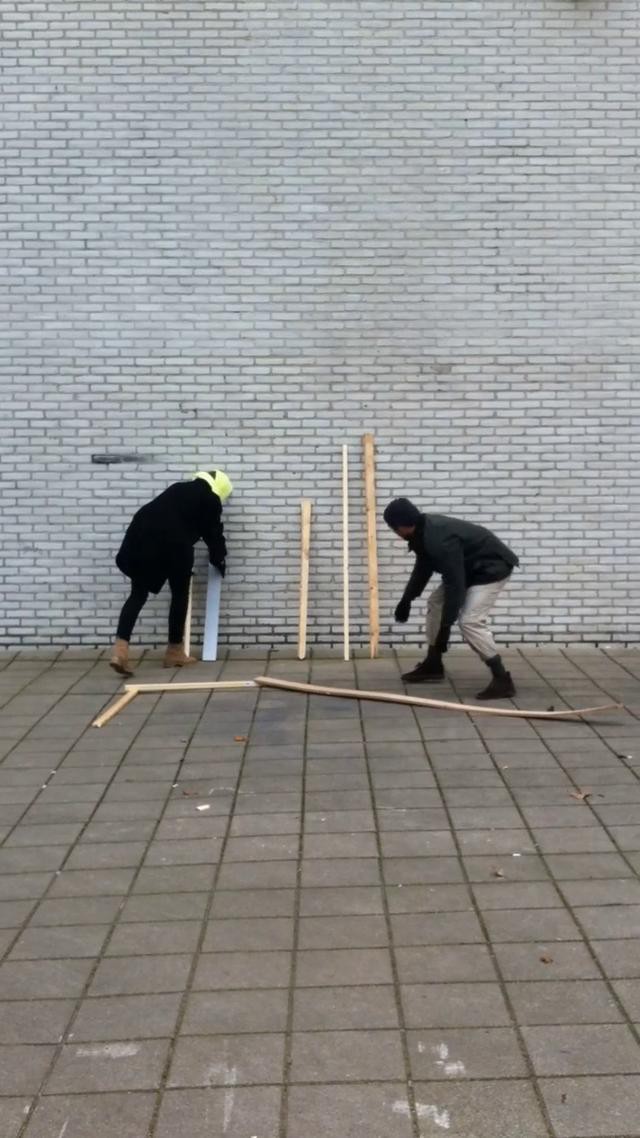
WHERE ARE WE GOING WALT WHITMAN? Studium Generale February 27
Lees meer
STUDIUM GENERALE RIETVELD ACADEMIE 2012-2013:
Wednesday February 27, 2013
at the Gym, Rietveld Academie
2–4 PM
WHERE ARE WE GOING, WALT WHITMAN?
An ecosophical roadmap for artists and other futurists
PROGRAM
(open to the general public)
-SPOKEN COLUMN: In response to T.J. Demos lecture ‘Contemporary Art and the Politics of Ecology’ (February 13) writer, researcher Christel Vesters invites us on a trail together with artists, architects and designers: "…from the streets and town squares (back) to the meadows and gardens…”
-KEY-NOTE LECTURE: elaborating on Spinoza and Guattari, and New Materialism, an emerging trend in 21st century thought, philosopher Rick Dolphijn will argue that only by experiencing, by experimenting, an alternative world can reveal itself. Only through art, we can map the radical "anotherness" inside nature.
-LAUNCH: the Where Are We Going, Walt Whitman-team is proud to present you with a roadmap to the upcoming conference -festival on March 12,13, 14, 15. The team will introduce you to some lines of thought, to facts and to fictions and announce the names of the main protagonists of this remarkable 4 day-long trip: a wonderful company of artists, poets, performers, writers, thinkers, musicians, activists, curators, organizers, educators & friends - all looking forward to meet you at the Rietveld Academie.
Click here for the website!
SPOKEN COLUMN: CHRISTEL VESTERS
…from the streets and town squares (back) to the meadows and gardens…
When we think of protest, the image that comes to mind is that of people taking to the streets and occupying town squares; never one of gardens or woodlands. In response to T.J. Demos lecture ‘Contemporary Art and the Politics of Ecology’, Christel Vesters embarks on a trail through woods, parks, farmlands, parks and community allotments exploring how these green sites function as spaces for political and social activism in the work of artists, architects and designers.
Christel Vesters is a writer and researcher who studied art history and curating in Amsterdam, New York and London. She has curated various exhibitions and discursive projects and regularly writes for international art publications such as MetropolisM, Afterall and FlashArt. Currently, Christel divides her time between her PhD research on the representation and production of alternative knowledge systems in contemporary art, and teaching Art Theory at the Gerrit Rietveld Academie.
KEY-NOTE LECTURE: RICK DOLPHIJN
Art as the Revelation of a World: Spinoza, Guattari and the New Materialist Alternative
In the summer Peaches the color of sunrise
In the fall
Plums the color of dusk
Robert Hass
There is a strong movement in academic and aesthetic activism that offers us a very different analysis of the state of the world today. Contrary to deep ecology and eco-criticism, which tend to be conservative and dualist (nature is different from culture, technology is alien to the world), the materialist tradition argues the contrary by mapping the various ecologies (environmental, social, mental) that make up the world we live in. Discussing key figures in 'materialist' or 'continental naturalist' thinking (Spinoza, Deleuze & Guattari) and several of the artists that practice a similar take on the world, we move to the discussions that are taking over the debate today examining the alternatives offered.
The current state of the earth, of life, demand us to change our thinking about nature, about matter, about technology, and especially about art, in a fundamental way. Moreover, to dismantle the most resilient powers that have been structuring the earth for so long, and more importantly, in such a bad way, “…requires all of the resources of art, and art of the highest kind”, as Deleuze and Guattari tell us. Only thus, by experiencing, by experimenting, an alternative world can reveal itself. Only through art, we can map the radical "anotherness" inside nature. By drawing the transversal lines between the different ecologies “the revelation of a world”, to quote Samuel Beckett, can be realized.
Rick Dolphijn is a writer and a philosopher. He is an assistant professor at the Faculty of Humanities, and senior fellow of the Centre for the Humanities, both at Utrecht University, the Netherlands.
He wrote a book entitled "New Materialism: Interviews and Cartographies" (soon to be published with Open Humanities Press in the series New Metaphysics (ed by Bruno Latour and Graham Harman) together with his colleague dr. Iris van der Tuin in which they systematically set out how the “new tradition” called new materialism is situated in philosophy, in the sciences and in the arts.
LAUNCH:
the Where Are We Going, Walt Whitman-team is proud to finally present you with a roadmap to the upcoming conference-festival on March 12, 13, 14, 15. The team will introduce you to some lines of thought, to facts and to fictions and announce the names of the main protagonists of this remarkable 4 day-long trip: a wonderful company of artists, poets, performers, writers, thinkers, musicians, activists, curators, organizers, educators & friends - all looking forward to meet you at the Rietveld Academie.
Warm wishes from the SG team, -
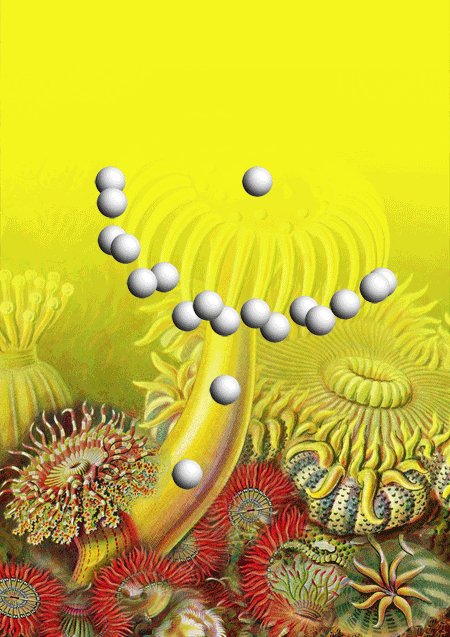
Studium Generale February 6
Lees meer
STUDIUM GENERALE RIETVELD ACADEMIE 2012-2013:
Wednesday February 06, 2013
at the Gym, Rietveld Academie
2–4 PM
WHERE ARE WE GOING, WALT WHITMAN?
An ecosophical roadmap for artists and other futurists
PROGRAM:
(Open to the general public.)
-SPOKEN COLUMN: 'Is the Revoluti- on, or off?', Clare Butcher curator and tutor at the Fine Art Dept at the Rietveld Academy asks in response to Marius de Geus lecture 'What Will The Future Bring Us, Bookchin And Naess?' (as presented at the Rietveld on Wednesday January the 30th in 2013).
-ARTIST CONTRIBUTION: Artist, educator, writer Renée Ridgway will confront the pharmaceutical industries claim that it is inventing new medicines, with the knowledge of thousands of years as it is contained in archival documents such as the Hortus Malabaricus, and in the ideas of scientist, seed activist and author Vandana Shiva.
-KEY-NOTE LECTURE: With his lecture 'Living in the Age of the World Motion Picture: Toward an Ecosophy of the Moving Image' Adrian Ivakhiv, Associate Professor of Environmental Thought and Culture at the University of Vermont, wonders how cinema is faring today; on the cusp of a digital era that heightens the speed of life in every direction – through the uncertainties of global hyper finance, the turbulence of cultural identity clashes and looming ecological collapses, and the rapid mutations of all manner of image, representation, spectacle and simulacrum.
Click here for the website!
SPOKEN COLUMN: CLARE BUTCHER
'Please Replace The Lamp' - appreciation and superfluity-
When the measure of progress is not in mega bites per second; when things reach the end of their useable lives; when the state of nature turns out to be a state of grace; is the Revoluti-on or off?
Clare Butcher (Zimbabwe) is a curator and writer who cooks. She is currently teaching in Fine Arts at the Rietveld Academy and taking some time to think.
ARTIST CONTRIBUTION: RENÉE RIDGWAY
Hortus Malabaricus
The Hortus Malabaricus is an archival document printed in Amsterdam between 1678-1693 and is the earliest comprehensive work on the flora of Malabar, illustrating around 740 indigenous plants whilst explaining their medicinal properties, with captions in 4 languages (Latin, Malayalam, Arabic, Konkani). Its spectacular, detailed renderings of Malabar plants made from copper engravings based on original watercolours are magnificently detailed. It is an illustrated botanical garden, a taxonomy of named plants, a medicinal bible or a translator’s dictionary or perhaps a work of art?
This compendium captures the world’s ecologies, imaging one of the most bio-diverse regions in the world, the state of Kerala in Southwest India. There, local medicine still makes use of the traditional knowledge contained in these pages and it is this ongoing usage that shows just how the pharmaceutical industry is not inventing new medicines with their patenting of plants, seeds and trees. This knowledge has been continuing for thousands of years and contemporary physicists and activists like Vandana Shiva demonstrate how these corporations gain control over our lives. This presentation will include images of past artistic exhibitions that draw on the contents and contemporary usage of the Hortus Malabaricus and a short interview with Vandana Shiva.
Renée Ridgway is an artist, free-lance curator, writer and educator based in Amsterdam, the Netherlands. Since completing her studies in fine art at the Rhode Island School of Design, (BFA) and Piet Zwart Institute (MA), she has exhibited widely in the Netherlands and internationally. Besides her work as a visual artist, Ridgway is co-initiator and contributor to n.e.w.s. (http://northeastwestsouth.net), a collective online platform for the analysis and development of art-related activities and curates the Roaming Academy at the DAI, a master’s curriculum that addresses the current context of art and its manifold economies.
KEY-NOTE LECTURE: ADRIAN IVAKHIV
Living in the Age of the World Motion Picture: Toward an Ecosophy of the Moving Image
Philosopher Martin Heidegger characterized the modern world as the “age of the world picture,” an era when the world itself became conquered by humanity as a picture or representation set fully and clearly before our gaze.
In the 1960s, the first images of the Earth from space delivered a glimpse of a world picture that was global and ecological, but that also suggested humanity’s domination both of the earth (today) and of outer space (tomorrow).
Fifty years later, we have not colonized other planets, but we might speak instead of the “age of the world motion picture,” an era when our colonization extends both to imaginary planets (like Avatar‘s Pandora) and to our very psyches and souls, and where we see both our world and our selves in turbulent and uncontrollable motion –- on screens around the globe.
The moving image has been with us just over a century, but over that time it seems the world itself has come to move faster and faster all around us. This talk will provide glimpses across that history, in its evolution from the first motion picture shorts to epics like Avatar (2009) and The Tree of Life (2011), and to the proliferating liveliness of YouTube and its many digital relatives. Like Charles Darwin’s image of nature as an ever branching bush, a “tangled bank” so “interesting to contemplate,” cinema’s branching bush continues to become ever more interesting to contemplate.
For cineaste and philosopher Gilles Deleuze, it was cinema that provided the greatest resource for reviving our lost “belief in this world.” How is cinema faring today, on the cusp of a digital era that heightens the speed of life in every direction –- through the uncertainties of global hyper finance, the turbulence of cultural identity clashes and looming ecological collapses, and the rapid mutations of all manner of image, representation, spectacle and simulacrum?
Adrian Ivakhiv will argue that the metaphysics most adequate for grasping the liveliness of this world of the moving image is a metaphysics of relational process — an aesthetics, ethics, and ecologics built on the insights of Charles S. Peirce, Alfred North Whitehead, and Gilles Deleuze.
Adrian Ivakhiv is Associate Professor of Environmental Thought and Culture at the University of Vermont. His writing spans a diverse range of environmental and cultural themes, with a focus on the affective dimensions of environmental perception, including the roles of visual media, technology, national and regional identity, and religious experience in conflicts over landscape, territory, place, and nature. His publications include Claiming Sacred Ground: Pilgrims and Politics at Glastonbury and Sedona (Indiana University Press, 2001), Ecologies of the Moving Image: Cinema, Affect, Nature (Wilfrid Laurier University Press, 2013), and the forthcoming Why Objects Fly Out the Window: A Process-Relational Manifesto-Thriller. He blogs at Immanence: Ecoculture, Geophilosophy, Mediapolitics.
Next week, Wednesday February 13, again from 2-4, Where Are We Going, Walt Whitman? welcomes both T.J. Demos (key-note)and Subhankar Banerjee (artist contribution) for the Dutch launch of a special issue of the art journal Third Text on "Contemporary Art and the Politics of Ecology". Next week's spoken column will be delivered by Arnisa Zeqo.
Warm wishes from the SG team,
Teaser Studium Generale February 6
Lees meer
STUDIUM GENERALE RIETVELD ACADEMIE 2012-2013:
Wednesday February 06, 2013
at the Gym, Rietveld Academie
2–4 PM
WHERE ARE WE GOING, WALT WHITMAN?
An ecosophical roadmap for artists and other futurists
PROGRAM:
(Open to the general public)
-SPOKEN COLUMN: 'Is the Revoluti- on, or off?', Clare Butcher curator and tutor at the Fine Art Dept at the Rietveld Academy asks in response to Marius de Geus lecture 'What Will The Future Bring Us, Bookchin And Naess?' (as presented at the Rietveld on Wednesday January the 30th in 2013).
-ARTIST CONTRIBUTION: Artist, educator, writer Renée Ridgway will confront the pharmaceutical industries claim that it is inventing new medicines, with the knowledge of thousands of years as it is contained in archival documents such as the Hortus Malabaricus, and in the ideas of scientist, seed activist and author Vandana Shiva.
-KEY-NOTE LECTURE: With his lecture 'Living in the Age of the World Motion Picture: Toward an Ecosophy of the Moving Image' Adrian Ivakhiv, Associate Professor of Environmental Thought and Culture at the University of Vermont, wonders how cinema is faring today; on the cusp of a digital era that heightens the speed of life in every direction – through the uncertainties of global hyper finance, the turbulence of cultural identity clashes and looming ecological collapses, and the rapid mutations of all manner of image, representation, spectacle and simulacrum.
Click here for the website!
SPOKEN COLUMN: CLARE BUTCHER
'Please Replace The Lamp' - appreciation and superfluity-
When the measure of progress is not in mega bites per second; when things reach the end of their useable lives; when the state of nature turns out to be a state of grace; is the Revoluti-on or off?
Clare Butcher (Zimbabwe) is a curator and writer who cooks. She is currently teaching in Fine Arts at the Rietveld Academy and taking some time to think.
ARTIST CONTRIBUTION: RENÉE RIDGWAY
Hortus Malabaricus
The Hortus Malabaricus is an archival document printed in Amsterdam between 1678-1693 and is the earliest comprehensive work on the flora of Malabar, illustrating around 740 indigenous plants whilst explaining their medicinal properties, with captions in 4 languages (Latin, Malayalam, Arabic, Konkani). Its spectacular, detailed renderings of Malabar plants made from copper engravings based on original watercolours are magnificently detailed. It is an illustrated botanical garden, a taxonomy of named plants, a medicinal bible or a translator’s dictionary or perhaps a work of art?
This compendium captures the world’s ecologies, imaging one of the most bio-diverse regions in the world, the state of Kerala in Southwest India. There, local medicine still makes use of the traditional knowledge contained in these pages and it is this ongoing usage that shows just how the pharmaceutical industry is not inventing new medicines with their patenting of plants, seeds and trees. This knowledge has been continuing for thousands of years and contemporary physicists and activists like Vandana Shiva demonstrate how these corporations gain control over our lives. This presentation will include images of past artistic exhibitions that draw on the contents and contemporary usage of the Hortus Malabaricus and a short interview with Vandana Shiva.
Renée Ridgway is an artist, free-lance curator, writer and educator based in Amsterdam, the Netherlands. Since completing her studies in fine art at the Rhode Island School of Design, (BFA) and Piet Zwart Institute (MA), she has exhibited widely in the Netherlands and internationally. Besides her work as a visual artist, Ridgway is co-initiator and contributor to n.e.w.s. (http://northeastwestsouth.net), a collective online platform for the analysis and development of art-related activities and curates the Roaming Academy at the DAI, a master’s curriculum that addresses the current context of art and its manifold economies.
KEY-NOTE LECTURE: ADRIAN IVAKHIV
Living in the Age of the World Motion Picture: Toward an Ecosophy of the Moving Image
Philosopher Martin Heidegger characterized the modern world as the “age of the world picture,” an era when the world itself became conquered by humanity as a picture or representation set fully and clearly before our gaze.
In the 1960s, the first images of the Earth from space delivered a glimpse of a world picture that was global and ecological, but that also suggested humanity’s domination both of the earth (today) and of outer space (tomorrow).
Fifty years later, we have not colonized other planets, but we might speak instead of the “age of the world motion picture,” an era when our colonization extends both to imaginary planets (like Avatar‘s Pandora) and to our very psyches and souls, and where we see both our world and our selves in turbulent and uncontrollable motion –- on screens around the globe.
The moving image has been with us just over a century, but over that time it seems the world itself has come to move faster and faster all around us. This talk will provide glimpses across that history, in its evolution from the first motion picture shorts to epics like Avatar (2009) and The Tree of Life (2011), and to the proliferating liveliness of YouTube and its many digital relatives. Like Charles Darwin’s image of nature as an ever branching bush, a “tangled bank” so “interesting to contemplate,” cinema’s branching bush continues to become ever more interesting to contemplate.
For cineaste and philosopher Gilles Deleuze, it was cinema that provided the greatest resource for reviving our lost “belief in this world.” How is cinema faring today, on the cusp of a digital era that heightens the speed of life in every direction –- through the uncertainties of global hyper finance, the turbulence of cultural identity clashes and looming ecological collapses, and the rapid mutations of all manner of image, representation, spectacle and simulacrum?
Adrian Ivakhiv will argue that the metaphysics most adequate for grasping the liveliness of this world of the moving image is a metaphysics of relational process — an aesthetics, ethics, and ecologics built on the insights of Charles S. Peirce, Alfred North Whitehead, and Gilles Deleuze.
Adrian Ivakhiv is Associate Professor of Environmental Thought and Culture at the University of Vermont. His writing spans a diverse range of environmental and cultural themes, with a focus on the affective dimensions of environmental perception, including the roles of visual media, technology, national and regional identity, and religious experience in conflicts over landscape, territory, place, and nature. His publications include Claiming Sacred Ground: Pilgrims and Politics at Glastonbury and Sedona (Indiana University Press, 2001), Ecologies of the Moving Image: Cinema, Affect, Nature (Wilfrid Laurier University Press, 2013), and the forthcoming Why Objects Fly Out the Window: A Process-Relational Manifesto-Thriller. He blogs at Immanence: Ecoculture, Geophilosophy, Mediapolitics.
Next week, Wednesday February 13, again from 2-4, Where Are We Going, Walt Whitman? welcomes both T.J. Demos (key-note)and Subhankar Banerjee (artist contribution) for the Dutch launch of a special issue of the art journal Third Text on "Contemporary Art and the Politics of Ecology". Next week's spoken column will be delivered by Arnisa Zeqo.
Warm wishes from the SG team,
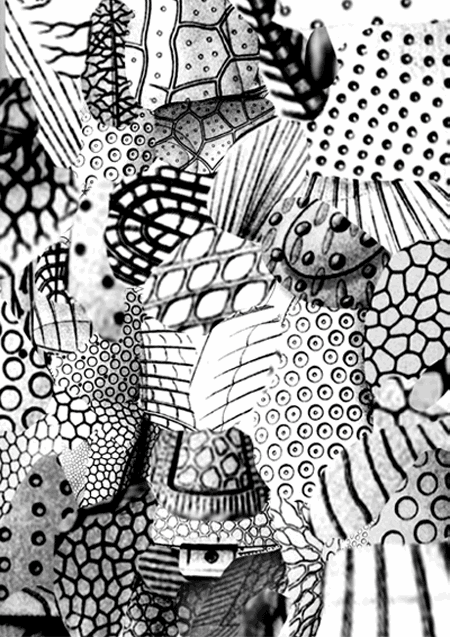
Studium Generale January 30
Lees meer
STUDIUM GENERALE RIETVELD ACADEMIE 2012-2013:
Wednesday January 30, 2013
at the Gym, Rietveld Academie
2–4 PM
WHERE ARE WE GOING, WALT WHITMAN?
An ecosophical roadmap for artists and other futurists
PROGRAM:
(Open to the general public)
SPOKEN COLUMN: Janice McNab, artist and tutor at the Fine Art Dept at the Rietveld Academie presents this week's spoken column in response to Joao Florencio's performance-lecture "Bodies that (Didn't) Matter: Ecologies of Art and Performance After the Anthropocene" on Wednesday December the 5th in 2012 .
KEY-NOTE LECTURE: Marius de Geus, lecturer in political philosophy at Leiden University will introduce the groundbreaking ecosophical visions of American anarchist Murray Bookchin and Norwegian father of Deep Ecology, Arne Naess.
ARTIST CONTRIBUTION: Jeffrey Babcock, filmmaker, performance artist, writer, cultural activist, best known in Amsterdam for his gripping work as a film programmer for the alternative cinema circuit, investigates how the psyche can effect future revolt and how that is related to the formation of underground cinemas.
Click here for the website!
SPOKEN COLUMN: JANICE MC NAB
The Anthropocene in the Aesthetic Economy Climate change is a truly strange object with time and space dimensions it is hard for the mind to grasp. Focussing on the images that were used to report on the Fukushima earthquake and Hurricane Sandy,this column will look at the aesthetic messaging within the notion of the Anthropocene, and ask how artists can respond to this sort of image economy. Janice McNab lives in Amsterdam and is an artist and a fine art tutor at the Rietveld Academy and the KABK, Den Haag.
KEY-NOTE LECTURE: MARIUS GEUS
What will the future bring us, Bookchin and Naess?
In this lecture Marius de Geus will present an introduction to Murray Bookchin(1921-2006), American libertarian socialist, author, orator and philosopher and Norwegian philosopher Arne Naess(1912-2009)and elaborate on their most fascinating theoretical views on the fundamental and underlying roots of our current ecological crisis. What are the main starting points of their ecological and political, philosophical and societal visions? Which are their main notions and ideas concerning a future ecologically balanced society ? More particularly: What does the anarchist Bookchin exactly mean by his innovative theoretical concept of “social ecology”? What do the ideas of academic Naess about the “intrinsic value of nature” imply for his ecosophical framework? How, according to their analysis, can such a futuristic green society be imagined ? And to what extent do their green philosophies differ or converge in terms of norms and values? Marius de Geus teaches political theory and environmental philosophy at the Institute of Political Science, Leiden University. He has published many articles and books about ecological utopias, the contemporary environmental debate, and on the social and ecological limits of our consumer society. His latest book is The End of Over-consumption(2003) and a new work about living the good life and ecological living will be published in the second half of 2013.
ARTIST CONTRIBUTION: JEFFREY BABCOCK
INVISIBLE IMAGES and Les Mains Négatives
Seeing social life as an ecology exposes us to some dilemmas and downright dangers. Firstly, ecological thinking has shifted radically from its very beginnings- from apocalyptic thought to offering us the heaven of a decentralised balance-seeking process, much like liberal economists' idea of the invisible hands. For the purpose of this seminar Jeffrey Babcock will go along with the idea of a social ecology, but then it seems essential to introduce some necessary antibodies into the theme. He will offer a short investigation into the ramifications of intimate revolt, drawing on the work of Bulgarian/French psychoanalyst Julia Kristeva and her experiences in the barricades of Paris in May 68 as a primary blueprint. What is the importance of revolt in any ecology? How is revolt/intimacy/creativity possible while we are being anesthetized by the vacant spectacle of marketing, technology and economics? How can the psyche effect future revolt? How can we be in the present and outside of time simultaneously? What is crucially being stolen from us through the gifts we receive? How can we deal with the situation of some images being crowded out, or watered down, by the proliferation of inessential images? What is the difference between revolt and revolution? And how is the formation of underground cinemas related to all this? Jeffrey Babcock is a filmmaker, performance artist, writer, film programmer and cultural activist. In recent years he has created a profusion of underground cinemas in Amsterdam where he provides an eclectic program of rarely seen films. Together with Agata Winska he has also published a book on the concepts behind his alternative cinemas called Screening as an Ideology (2011).
Next week, Wednesday February 6, again from 2-4, Where Are We Going, Walt Whitman? welcomes Professor Adrian Ivakhiv from the University of Vermont for a lecture on Eco-politics and Cinema. The spoken column will be delivered by Clare Butcher and the artist presentation by Renée Ridgway.
Warm wishes from the SG team,
Studium Generale 2012-2013
Lees meer
STUDIUM GENERALE RIETVELD ACADEMIE 2012-2013:
Wednesday January 30, 2013
at the Gym, Rietveld Academie
2–4 PM
WHERE ARE WE GOING, WALT WHITMAN?
An ecosophical roadmap for artists and other futurists
PROGRAM:
(Open to the general public)
SPOKEN COLUMN: Janice McNab, artist and tutor at the Fine Art Dept at the Rietveld Academie presents this week's spoken column in response to Joao Florencio's performance-lecture "Bodies that (Didn't) Matter: Ecologies of Art and Performance After the Anthropocene" on Wednesday December the 5th in 2012 .
KEY-NOTE LECTURE: Marius de Geus, lecturer in political philosophy at Leiden University will introduce the groundbreaking ecosophical visions of American anarchist Murray Bookchin and Norwegian father of Deep Ecology, Arne Naess.
ARTIST CONTRIBUTION: Jeffrey Babcock, filmmaker, performance artist, writer, cultural activist, best known in Amsterdam for his gripping work as a film programmer for the alternative cinema circuit, investigates how the psyche can effect future revolt and how that is related to the formation of underground cinemas.
Click here for the website!
SPOKEN COLUMN: JANICE MC NAB
The Anthropocene in the Aesthetic Economy Climate change is a truly strange object with time and space dimensions it is hard for the mind to grasp. Focussing on the images that were used to report on the Fukushima earthquake and Hurricane Sandy,this column will look at the aesthetic messaging within the notion of the Anthropocene, and ask how artists can respond to this sort of image economy. Janice McNab lives in Amsterdam and is an artist and a fine art tutor at the Rietveld Academy and the KABK, Den Haag.
KEY-NOTE LECTURE: MARIUS GEUS
What will the future bring us, Bookchin and Naess?
In this lecture Marius de Geus will present an introduction to Murray Bookchin(1921-2006), American libertarian socialist, author, orator and philosopher and Norwegian philosopher Arne Naess(1912-2009)and elaborate on their most fascinating theoretical views on the fundamental and underlying roots of our current ecological crisis. What are the main starting points of their ecological and political, philosophical and societal visions? Which are their main notions and ideas concerning a future ecologically balanced society ? More particularly: What does the anarchist Bookchin exactly mean by his innovative theoretical concept of “social ecology”? What do the ideas of academic Naess about the “intrinsic value of nature” imply for his ecosophical framework? How, according to their analysis, can such a futuristic green society be imagined ? And to what extent do their green philosophies differ or converge in terms of norms and values? Marius de Geus teaches political theory and environmental philosophy at the Institute of Political Science, Leiden University. He has published many articles and books about ecological utopias, the contemporary environmental debate, and on the social and ecological limits of our consumer society. His latest book is The End of Over-consumption(2003) and a new work about living the good life and ecological living will be published in the second half of 2013.
ARTIST CONTRIBUTION: JEFFREY BABCOCK
INVISIBLE IMAGES and Les Mains Négatives
Seeing social life as an ecology exposes us to some dilemmas and downright dangers. Firstly, ecological thinking has shifted radically from its very beginnings- from apocalyptic thought to offering us the heaven of a decentralised balance-seeking process, much like liberal economists' idea of the invisible hands. For the purpose of this seminar Jeffrey Babcock will go along with the idea of a social ecology, but then it seems essential to introduce some necessary antibodies into the theme. He will offer a short investigation into the ramifications of intimate revolt, drawing on the work of Bulgarian/French psychoanalyst Julia Kristeva and her experiences in the barricades of Paris in May 68 as a primary blueprint. What is the importance of revolt in any ecology? How is revolt/intimacy/creativity possible while we are being anesthetized by the vacant spectacle of marketing, technology and economics? How can the psyche effect future revolt? How can we be in the present and outside of time simultaneously? What is crucially being stolen from us through the gifts we receive? How can we deal with the situation of some images being crowded out, or watered down, by the proliferation of inessential images? What is the difference between revolt and revolution? And how is the formation of underground cinemas related to all this? Jeffrey Babcock is a filmmaker, performance artist, writer, film programmer and cultural activist. In recent years he has created a profusion of underground cinemas in Amsterdam where he provides an eclectic program of rarely seen films. Together with Agata Winska he has also published a book on the concepts behind his alternative cinemas called Screening as an Ideology (2011).
Next week, Wednesday February 6, again from 2-4, Where Are We Going, Walt Whitman? welcomes Professor Adrian Ivakhiv from the University of Vermont for a lecture on Eco-politics and Cinema. The spoken column will be delivered by Clare Butcher and the artist presentation by Renée Ridgway.
Warm wishes from the SG team,
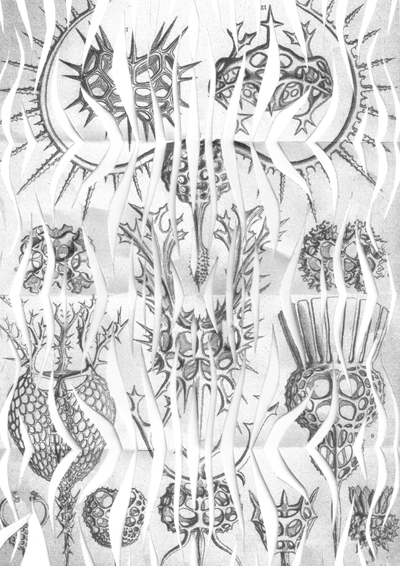
Studium Generale 2012 - 2013
Lees meer
STUDIUM GENERALE RIETVELD ACADEMIE 2012 - 2013
WHERE ARE WE GOING, WALT WHITMAN?
An ecosophical roadmap for artists and other futurists.
November 14 December 05 February 13 November 21 January 30 February 27 November 28 February 06
Wednesdays at the Gym, 2 to 4 PM
free entrance
Conference-Festival coming up:
12-15 March 2013
information about > Studium Generale
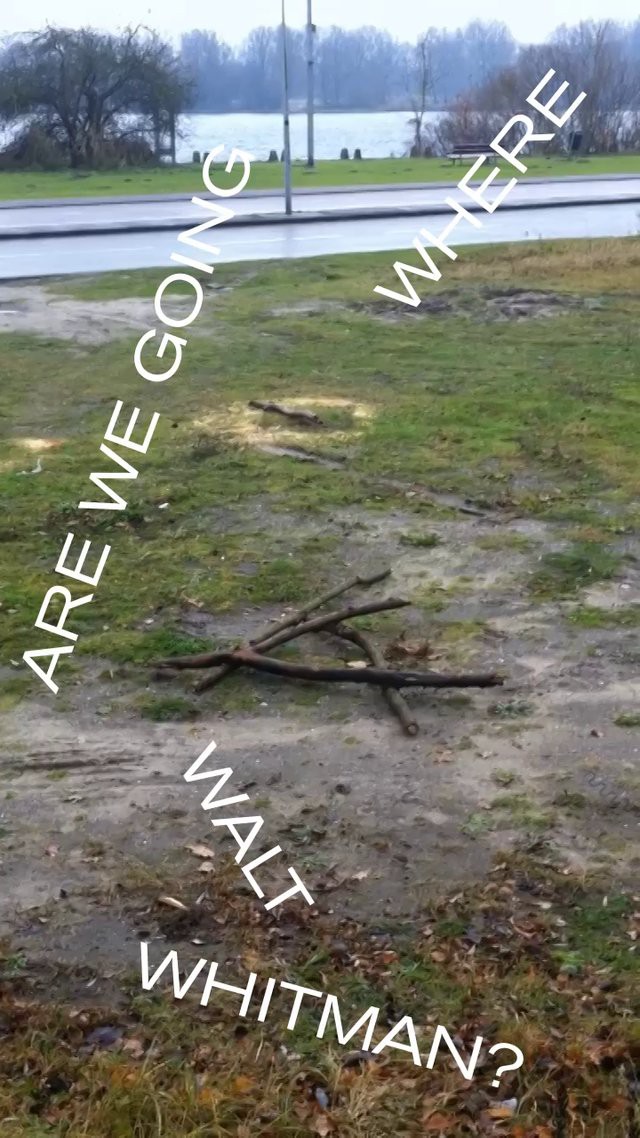
Studium Generale Where are we going Walt Whitman?
Lees meer
Voor alle informatie, kijk bij Studium Generale 2012-2013
all graphic design and video's made by students of the Graphic Design department:
Martin Huger
Rudy Guedj
Sophie Rogg
Olya Troitskaya
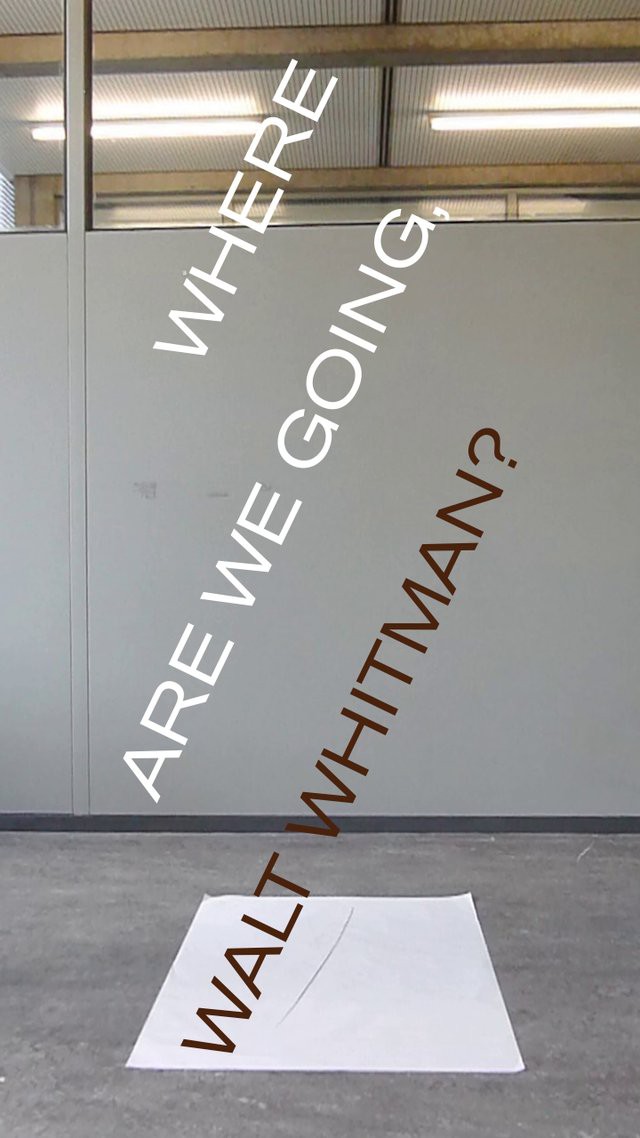
Studium Generale, video uitnodiging I
Lees meer
For all information visit Studium Generale 2012-2013
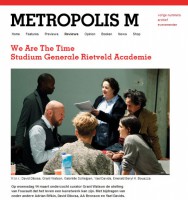
Studium Generale: We Are The Time in Metropolis M
Lees meer
Lees het artikel op Metropolis M over: We Are The Time Studium Generale Rietveld Academie
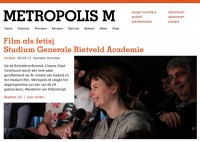
Cinema Clash Continuum in Metropolis M
Lees meer
Metropolis M volgde een dagprogramma van het Studium Generale.
Verslaggeving van Sanneke Huisman, Metropolis M
Metropolis M
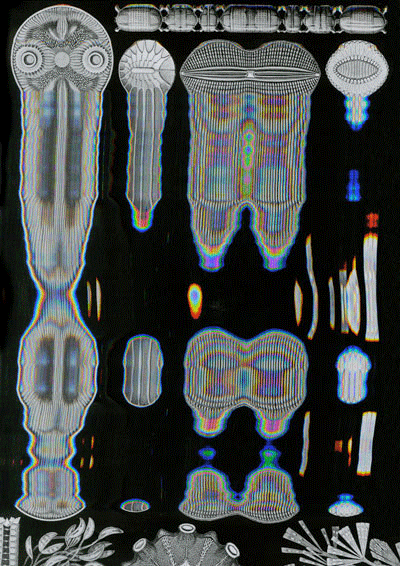
28 november 2012 Studium Generale Where Are We Going Walt Whitman?
Lees meer
PROGRAM:
Spoken Column : Saying no in/to democracy by Samuel Vriezen
Key Note: Future Calling: Being Human in a Networked Society by Nishant Shah
Artist Contribution: The Arbour Lake Sghool by John Frosst
SPOKEN COLUMN: SAMUEL VRIEZEN
Saying no in/to democracy
he ecological vision of a proliferation of things and their inter-relationships, maps perfectly onto a certain ideal of democracy as was sung by the American bard, Walt Whitman. There is great revolutionary potential in this vision of endless flux and uncontrollable growth, but it is also the world of liberal capitalism – one which, by definition, is not always acceptable. For artists of course, the potential to connect and form relationships is always hugely attractive, because it is a source of creativity. But what about saying no? What if you live in ethical circumstances whereby you can't just go and celebrate everything that exists? What if sometimes you actually need to cut the connections and see democracy itself as a limiting regime? We might contrast the vitalist, ecosophical, democratic vision of Whitman with the much more defiant vision, equally inspired by nature, of the anarchist Henry David Thoreau – and ask ourselves what he might have to say in relation to our era, in which trans-national capitalist instabilities rule a ‘democratic’ world in an almost totalitarian manner.
Samuel Vriezen is a composer, pianist and writer. Much of his work investigates how different types of time operate in relation to one another and the space for action generated by such mixtures. In his texts, voices and meanings are mixed in highly structured forms, and in his music, actions and layers of metre and rhythm interfere with one another to form complex temporalities. He has collaborated with ensembles and musicians all over the world, and published two books of poetry as well as many essays and poetry translations. Currently, Vriezen is working on a CD of conceptual piano music written by himself and by composer Tom Johnson, to be released on the German label, Wandelweiser, in the spring of 2013.
KEY NOTE: NISHANT SHAH
Future Calling: Being Human in a Networked Society The rise of the network as a metaphor that explains our existence – individual and collective – has been meteoric. From being a society dealing with the information explosion, we have quickly evolved into talking about networked societies, living with the paradox of being simultaneously incessantly connected and increasingly individuated – of being ‘Alone Together’. Our ideas of who we are, where we are going, and how we are getting there have taken a new turn with the network that reduces and abstracts the whole of our life and living into mappable, understandable transactions within a multi-nodal ecology. This talk examines the network, especially the digital network, as a way by which we re-configure our pasts and imagine our futures, and questions the tenacity and value of this persistent explanatory framework. In the attempt, it focuses on the affects, emotions and values that slip through the porous borders of the networks, threatening to undermine the conditions of being human. Nishant Shah is the co-founder and Director-Research at the Centre for Internet and Society Bangalore, India. He is a visiting fellow at the International Institute of Social Studies and a Knowledge Partner with Hivos, Den Haag, the Netherlands. He has worked as an information architect and Cybercultures consultant for MNCs like Yahoo! and Partecs, for NGOs such as CSCS, and Khoj, and for governments in Asia, advising them on building deliberative and participatory frameworks of community engagement. Nishant’s ongoing research is investigating the ways in which young people in the global South are changing the world we live in through their use of digital and networked technologies. He is co-editor and the leading researcher for a 4-volume collection titled ‘Digital AlterNatives with a Cause?’ and has recently initiated a dialogue that looks at Networks as Habits of Living.
ARTIST PRESENTATION: JOHN FROSST
The Arbour Lake Sghool John Frosst is a member and co-founder of the Canadian art collective, The Arbour Lake Sghool. The group began in a suburban house in Calgary, Alberta, Canada, using the home as a living space, studio and exhibition hall. Formed from a loose collection of artists, musicians and technicians, the group presents entertaining and critical reflections on suburban ecology. The Arbour Lake Sghool is currently working at the Kunstvlaai festival of independents, designing everyday and whimsical products with students from the British School and building them over the course of the festival.
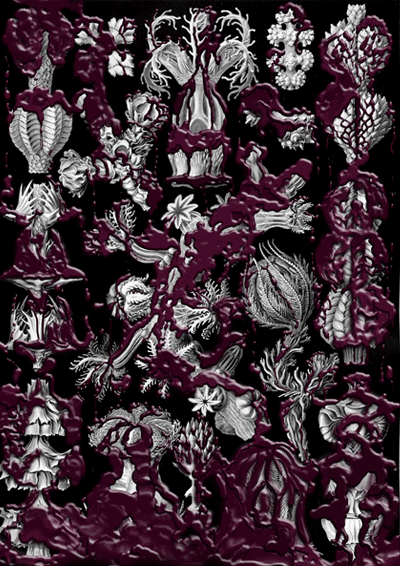
5 december 2012 Studium Generale Where Are We Going Walt Whitman?
Lees meer
PROGRAM:
Spoken column: The Good the Bad and the Ugly:
what's so hot about being human anyway? by Simon Ferdinando.
Guest presentation including 2 artist contributions: Yes, Naturally by Ine Gevers & artists Sjaak Langenberg & Tea Mäkipää respectively.
Key-note: Bodies That (Didn’t) Matter: Ecologies Of Art And Performance After The Anthropocene by João Florêncio.
SPOKEN COLUMN: SIMON FERDINANDO
The Good the Bad and the Ugly: what's so hot about being human anyway? Simon Ferdinando in response to last week’s key-note, Nishant Shah's Future Calling - Being Human in a Networked Society.
The rise and spread of the global digital network is both mirroring and defining social relations across this cute little planet of ours. But machines always produce ghosts... Is Bambi's death the measure of Artaud's terminal curses?
Simon Ferdinando is an Amsterdam based practicing artist and curator and MPhil/PhD researcher at Liverpool John Moores University where he is researching parallels and relationships between the interpretations and inspirations of the works of Vincent Van Gogh made by Antonin Artaud and Francis Bacon.
GUEST PRESENTATION INCLUDING 2 ARTIST CONTRIBUTIONS:
INE GEVERS, SJAAK LANGENBERG & TEA MÄKIPÄÄ Ja Natuurlijk Yes Naturally - How art saves the world is an expanded art exhibition in the making. March 15, 2013 it will open at the Museum of Contemporary Art and Gemeentemuseum The Hague. Ine Gevers, artistic director of Yes Naturally, will elaborate on the notion of “ecology without nature” by theorist Timothy Morton, one of the keynote authors of the upcoming Yes Naturally publication (Nai010 Publishers). As part of her presentation Ine Gevers will also introduce two artists who will speak about their work and their contribution to Yes Naturally.
Tea Mäkipää is a Finnish artist, based in Germany. Her artworks, among which Atlantis, 2008 and EDEN II, 2011 have been featured in many prominent international art exhibitions around the world. Themes in Mäkipää’s work include consumerism, environmental issues, social-economic differences, as well as globalization's disadvantages.
Sjaak Langenberg is an artist and essayist. He works together with designer Rosé de Beer on projects that take place mostly outside of the usual art context. They respond to issues current within the discourses surrounding, environmental planning, social relationships, identity abuse and falsification of history in architecture and city development. In 2012 Sjaak Langenberg and Rosé de Beer have been the Rietveld Research Residents (at the Rietveld Academie).
KEY NOTE: JOÃO FLORÊNCIO
Bodies That (Didn’t) Matter: Ecologies Of Art And Performance After The Anthropocene
On the 11th of March, 2011, at exactly 14:46 JST, the Pacific Coast of Tōhoku in the Northeast of Honshu, Japan, was hit by the 9.0 magnitude-strong Great East Japan Earthquake. What followed is widely known: a series of malfunctions and meltdowns eventually led to several hydrogen explosions at the Fukushima Daiichi Nuclear Power Plant, which eventually resulted in a mass discharge of radioactive material and in the biggest nuclear accident since Chernobyl.
Taking the Fukushima episode as the latest in a series of events that may serve, in the future, as geological markers of what chemist and Nobel prize winner Paul Crutzen famously named the Anthropocene, this lecture will consider the impact of the current ecological crisis in the ongoing project of Enlightenment and Modernity and, in particular, the ways in which a recognition of the Anthropocene forces us to rethink existing theories of art and performance
João Florêncio is a PhD candidate in Visual Cultures at Goldsmiths, University of London, where he is also responsible for leading the “Modernities” seminars and laboratories. He has been widely published across the world in books, academic journals, and exhibition catalogues, and has shown installation and performance works in several London galleries.
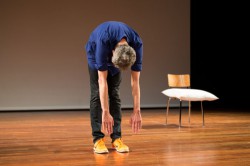
2016-04-11 16:47:46
Xavier Le Roy performing Product of Circumstances
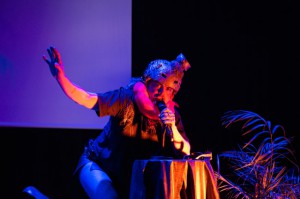
2016-04-11 11:08:55
Geo Wyeth, performance Tennis Player 2.0
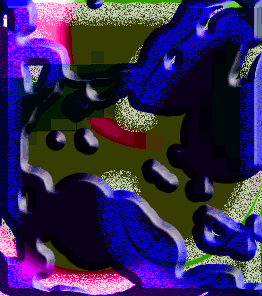
2016-04-04 15:13:17
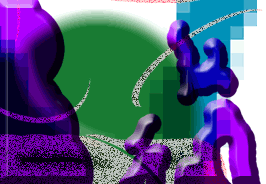
2016-04-04 15:12:37
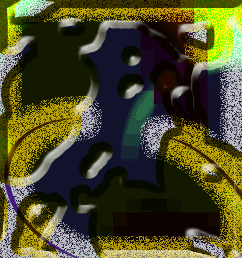
2016-04-04 15:12:22
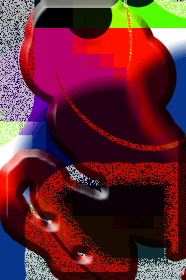
2016-04-04 15:12:13
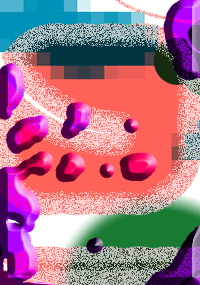
2016-04-04 15:11:56
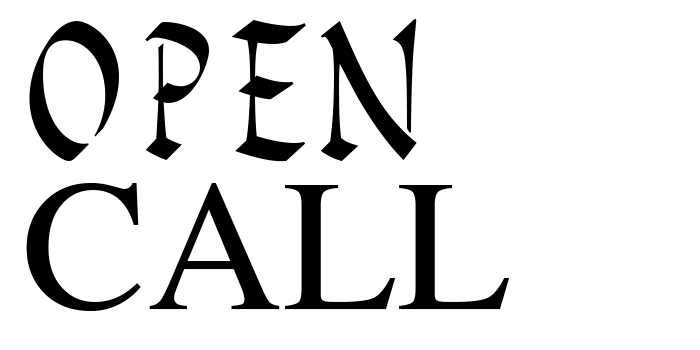
2016-03-24 12:40:03
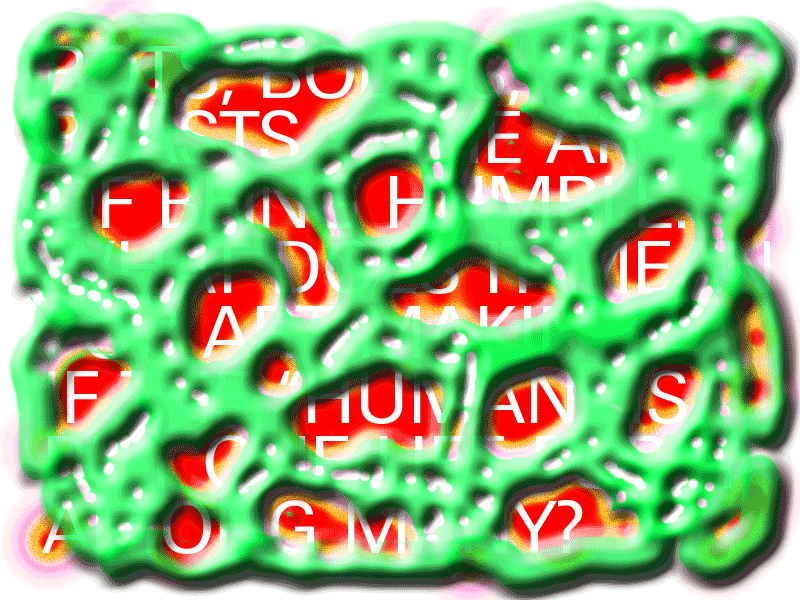
2016-03-15 10:47:08
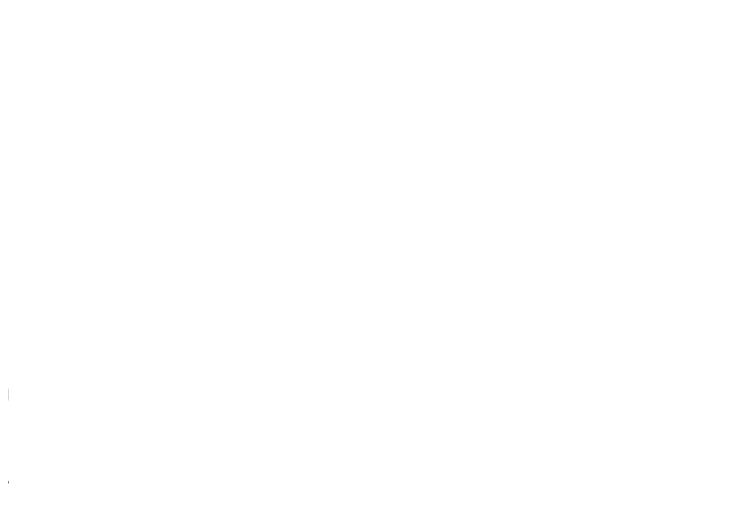
2016-03-07 07:05:46
